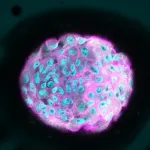(Press-News.org) CAMBRIDGE, MA -- This block is broken or missing. You may be missing content or you might need to enable the original module.
Cancer drugs known as checkpoint blockade inhibitors have proven effective for some cancer patients. These drugs work by taking the brakes off the body’s T cell response, stimulating those immune cells to destroy tumors.
Some studies have shown that these drugs work better in patients whose tumors have a very large number of mutated proteins, which scientists believe is because those proteins offer plentiful targets for T cells to attack. However, for at least 50 percent of patients whose tumors show a high mutational burden, checkpoint blockade inhibitors don’t work at all.
A new study from MIT reveals a possible explanation for why that is. In a study of mice, the researchers found that measuring the diversity of mutations within a tumor generated much more accurate predictions of whether the treatment would succeed than measuring the overall number of mutations.
If validated in clinical trials, this information could help doctors to better determine which patients will benefit from checkpoint blockade inhibitors.
“While very powerful in the right settings, immune checkpoint therapies are not effective for all cancer patients. This work makes clear the role of genetic heterogeneity in cancer in determining the effectiveness of these treatments,” says Tyler Jacks, the David H. Koch Professor of Biology and a member of MIT’s Koch Institute for Cancer Research.
Jacks; Peter Westcott, a former MIT postdoc in the Jacks lab who is now an assistant professor at Cold Spring Harbor Laboratory; and Isidro Cortes-Ciriano, a research group leader at EMBL’s European Bioinformatics Institute (EMBL-EBI), are the senior authors of the paper, which appears today in Nature Genetics.
A diversity of mutations
Across all types of cancer, a small percentage of tumors have what is called a high tumor mutational burden (TMB), meaning they have a very large number of mutations in each cell. A subset of these tumors has defects related to DNA repair, most commonly in a repair system known as DNA mismatch repair.
Because these tumors have so many mutated proteins, they are believed to be good candidates for immunotherapy treatment, as they offer a plethora of potential targets for T cells to attack. Over the past few years, the FDA has approved a checkpoint blockade inhibitor called pembrolizumab, which activates T cells by blocking a protein called PD-1, to treat several types of tumors that have a high TMB.
However, subsequent studies of patients who received this drug found that more than half of them did not respond well or only showed short-lived responses, even though their tumors had a high mutational burden. The MIT team set out to explore why some patients respond better than others, by designing mouse models that closely mimic the progression of tumors with high TMB.
These mouse models carry mutations in genes that drive cancer development in the colon and lung, as well as a mutation that shuts down the DNA mismatch repair system in these tumors as they begin to develop. This causes the tumors to generate many additional mutations. When the researchers treated these mice with checkpoint blockade inhibitors, they were surprised to find that none of them responded well to the treatment.
“We verified that we were very efficiently inactivating the DNA repair pathway, resulting in lots of mutations. The tumors looked just like they look in human cancers, but they were not more infiltrated by T cells, and they were not responding to immunotherapy,” Westcott says.
The researchers discovered that this lack of response appears to be the result of a phenomenon known as intratumoral heterogeneity. This means that, while the tumors have many mutations, each cell in the tumor tends to have different mutations than most of the other cells. As a result, each individual cancer mutation is “subclonal,” meaning that it is expressed in a minority of cells. (A “clonal” mutation is one that is expressed in all of the cells.)
In further experiments, the researchers explored what happened as they changed the heterogeneity of lung tumors in mice. They found that in tumors with clonal mutations, checkpoint blockade inhibitors were very effective. However, as they increased the heterogeneity by mixing tumor cells with different mutations, they found that the treatment became less effective.
“That shows us that intratumoral heterogeneity is actually confounding the immune response, and you really only get the strong immune checkpoint blockade responses when you have a clonal tumor,” Westcott says.
Failure to activate
It appears that this weak T cell response occurs because the T cells simply don’t see enough of any particular cancerous protein, or antigen, to become activated, the researchers say. When the researchers implanted mice with tumors that contained subclonal levels of proteins that normally induce a strong immune response, the T cells failed to become powerful enough to attack the tumor.
“You can have these potently immunogenic tumor cells that otherwise should lead to a profound T cell response, but at this low clonal fraction, they completely go stealth, and the immune system fails to recognize them,” Westcott says. “There’s not enough of the antigen that the T cells recognize, so they’re insufficiently primed and don’t acquire the ability to kill tumor cells.”
To see if these findings might extend to human patients, the researchers analyzed data from two small clinical trials of people who had been treated with checkpoint blockade inhibitors for either colorectal or stomach cancer. After analyzing the sequences of the patients’ tumors, they found that patients’ whose tumors were more homogeneous responded better to the treatment.
“Our understanding of cancer is improving all the time, and this translates into better patient outcomes,” Cortes-Ciriano says. “Survival rates following a cancer diagnosis have significantly improved in the past 20 years, thanks to advanced research and clinical studies. We know that each patient’s cancer is different and will require a tailored approach. Personalized medicine must take into account new research that is helping us understand why cancer treatments work for some patients but not all.”
The findings also suggest that treating patients with drugs that block the DNA mismatch repair pathway, in hopes of generating more mutations that T cells could target, may not help and could be harmful, the researchers say. One such drug is now in clinical trials.
“If you try to mutate an existing cancer, where you already have many cancer cells at the primary site and others that may have disseminated throughout the body, you’re going to create a super heterogeneous collection of cancer genomes. And what we showed is that with this high intratumoral heterogeneity, the T cell response is confused and there is absolutely no response to immune checkpoint therapy,” Westcott says.
###
The research was funded by the Koch Institute Support (core) Grant from the U.S. National Cancer Institute, the Howard Hughes Medical Institute, and a Damon Runyon Fellowship Award.
END
Study explains why certain immunotherapies don’t always work as predicted
The findings could help doctors identify cancer patients who would benefit the most from drugs called checkpoint blockade inhibitors.
2023-09-14
ELSE PRESS RELEASES FROM THIS DATE:
Growth of large operators threatens existence of grassroots coworking spaces, study warns
2023-09-14
The growing number of large operators and developers opening coworking premises threatens to end the availability of grassroots community-oriented spaces designed to bring isolated workers together, a new study warns.
These coworking communities were originally set up to create serendipitous encounters, knowledge-sharing opportunities, and social capital. But the increasing numbers of big companies running flexible offices means they are less likely to offer services matching these aims.
Smaller operators see the incursion by large commercial real estate developers ...
Using topology, Brown researchers advance understanding of how cells organize themselves
2023-09-14
PROVIDENCE, R.I. [Brown University] — The fact that humans and other living organisms can develop and grow from a single cell relies on a process called embryonic development. For healthy tissue to form, cells in the embryo have to organize themselves in the right way in the right place at the right time. When this process doesn’t go right, it can result in birth defects, impaired tissue regeneration or cancer. All of which makes understanding how different cell types organize into a complex tissue ...
A call for better energy system models to enable a decarbonized future
2023-09-14
Energy system models fail to accurately represent energy storage and might recommend decarbonization strategies that make electric grids less reliable.
Policy makers and utilities need robust energy system models to determine the best strategies to decarbonize the world’s electric grids. But most existing models were designed for grids operating more than a decade ago. Today’s grids are much different. New technologies such as solar power and grid energy storage are being rapidly deployed. To accommodate these and other technologies, utilities must run grids in completely new ways.
Improvements are needed in energy system ...
Stretching the truth: New research reveals negative effects of exaggerative political statements
2023-09-14
Justifying policies through unsubstantiated or slightly invalid arguments can have a significantly negative effect on the public opinion of politicians, according to new research from City, University of London.
With increasing scrutiny on global government policies in a ‘post-truth’ era, and in the aftermath of the Covid-19 pandemic that polarised international responses and reactions to the virus, an increased focus has been placed on policymakers to justify their actions and validate reasons for taking decisions.
Short of lying, this can often politicians “stretching arguments” – making invalid claims that are difficult to both prove and disprove.
The study, ...
Aegis Consortium funds research aimed at reducing the threat of future pandemics
2023-09-14
The Aegis Consortium, an initiative of the University of Arizona Health Sciences, awarded approximately $650,000 in seed funding to eight pilot research projects in the areas of pandemic control, prediction or preparedness; post-acute effects of pandemics on individuals and societies; and the resilience of built and natural environments.
“As we explore the challenges of pandemics such as COVID-19, we will continue to expand our investigative reach with domestic and international research teams to provide a range ...
UNIST releases generative AI utilization guide to promote smart usage of ChatGPT
2023-09-14
Under the leadership of UNIST Education Innovation Task Force, a comprehensive guidebook titled ‘A Guide to the Use of Generatvie AI‘ was released on July 28, 2023. This guidebook presents alternative approaches to utilize generative AI, like ChatGPT more efficiently rather than simply prohibiting their use. With a focus on teachers, researchers, and students, the 50-page guidebook provides practical examples of generative AI utilization.
To gain insights into the purpose and development ...
Preventing the tissue's response to stiffness may be key to slowing the progression of breast tumors
2023-09-14
Cells are capable of translating mechanical changes into biological responses. This process is known as mechanotransduction and plays a fundamental role in the progression of solid tumors, such as breast cancer.
It is well-established that a common mechanical alteration in cancer progression involves tissue hardening. This stiffness is precisely what is detected during self-examinations or breast palpations for potential tumor detection. The stiffness of breast tissue triggers a chain reaction, inducing tension within cells and distorting their nuclei. Ultimately, this nuclear deformation activates genes responsible for controlling cell proliferation, which are closely associated ...
Members of the National Association of Neonatal Nurses support efforts to promote racial equity
2023-09-14
September 14, 2023 — More than 90% of the active members of the National Association of Neonatal Nurses (NANN) believe the organization should pursue racial equity work, and many have specific suggestions for a strategic plan. This feedback comes from the survey results the association released this month in its journal, Advances in Neonatal Care. The journal is published in the Lippincott portfolio by Wolters Kluwer.
"Neonatal care has advanced significantly in recent years, yet ...
Webb Confirms accuracy of universe’s expansion rate measured by Hubble, deepens mystery of Hubble constant tension
2023-09-14
The rate at which the universe is expanding, known as the Hubble constant, is one of the fundamental parameters for understanding the evolution and ultimate fate of the cosmos. However, a persistent difference called the “Hubble Tension” is seen between the value of the constant measured with a wide range of independent distance indicators and its value predicted from the big bang afterglow.
NASA’s James Webb Space Telescope provides new capabilities to scrutinize and refine some of the strongest observational evidence for this tension. Nobel Laureate Adam Riess from the Johns Hopkins University and ...
Penn Medicine’s Carl June, MD, to receive 2024 Breakthrough Prize in Life Sciences
2023-09-14
PHILADELPHIA – CAR T cell therapy pioneer Carl June, MD, the Richard W. Vague Professor in Immunotherapy in the Perelman School of Medicine at the University of Pennsylvania and director of the Center for Cellular Immunotherapies (CCI) at Penn Medicine’s Abramson Cancer Center, has been named a winner of the 2024 Breakthrough Prize in Life Sciences for the development of chimeric antigen receptor (CAR) T cell immunotherapy, a revolutionary cancer treatment approach in which each patient’s T cells are modified to target and kill their cancer cells. The invention sparked a new path in cancer care, harnessing the power of patients’ own immune systems, a once-elusive ...
LAST 30 PRESS RELEASES:
Breaking the efficiency barrier: Researchers propose multi-stage solar system to harness the full spectrum
A new name, a new beginning: Building a green energy future together
From algorithms to atoms: How artificial intelligence is accelerating the discovery of next-generation energy materials
Loneliness linked to fear of embarrassment: teen research
New MOH–NUS Fellowship launched to strengthen everyday ethics in Singapore’s healthcare sector
Sungkyunkwan University researchers develop next-generation transparent electrode without rare metal indium
What's going on inside quantum computers?: New method simplifies process tomography
This ancient plant-eater had a twisted jaw and sideways-facing teeth
Jackdaw chicks listen to adults to learn about predators
Toxic algal bloom has taken a heavy toll on mental health
Beyond silicon: SKKU team presents Indium Selenide roadmap for ultra-low-power AI and quantum computing
Sugar comforts newborn babies during painful procedures
Pollen exposure linked to poorer exam results taken at the end of secondary school
7 hours 18 mins may be optimal sleep length for avoiding type 2 diabetes precursor
Around 6 deaths a year linked to clubbing in the UK
Children’s development set back years by Covid lockdowns, study reveals
Four decades of data give unique insight into the Sun’s inner life
Urban trees can absorb more CO₂ than cars emit during summer
Fund for Science and Technology awards $15 million to Scripps Oceanography
New NIH grant advances Lupus protein research
New farm-scale biochar system could cut agricultural emissions by 75 percent while removing carbon from the atmosphere
From herbal waste to high performance clean water material: Turning traditional medicine residues into powerful biochar
New sulfur-iron biochar shows powerful ability to lock up arsenic and cadmium in contaminated soils
AI-driven chart review accurately identifies potential rare disease trial participants in new study
Paleontologist Stephen Chester and colleagues reveal new clues about early primate evolution
UF research finds a gentler way to treat aggressive gum disease
Strong alcohol policy could reduce cancer in Canada
Air pollution from wildfires linked to higher rate of stroke
Tiny flows, big insights: microfluidics system boosts super-resolution microscopy
Pennington Biomedical researcher publishes editorial in leading American Heart Association journal
[Press-News.org] Study explains why certain immunotherapies don’t always work as predictedThe findings could help doctors identify cancer patients who would benefit the most from drugs called checkpoint blockade inhibitors.



